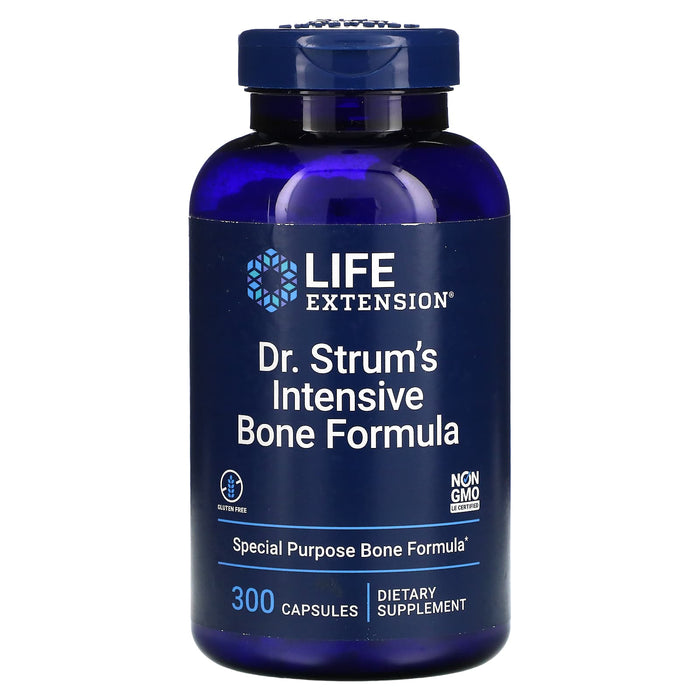




| Serving Size: 10 Capsules | ||
| Servings Per Container: 30 | ||
| Amount Per Serving | % Daily Value | |
| Vitamin D3 (as cholecalciferol) |
200 mcg | 1000% |
| Vitamin K2 (as trans menaquinone-7) |
200 mcg |
167% |
| Calcium [as calcium carbonate, citrate malate] |
800 mg |
62% |
| Magnesium (as magnesium citrate) |
400 mg |
95% |
| Zinc (as zinc citrate) |
10 mg | 91% |
| Potassium (as potassium citrate supplying 30 milliequivalents potassium) |
1173 mg |
25% |
| Winged treebine extract (aerial part) [std. to 10% ketosterones] |
600 mg |
** |
| Silicon (from std. Bamboo extract (stem leaf) silicon dioxide] |
49 mg |
** |
| Boron (from boron citrate, aspartate, glycinate) | 6 mg | ** |
| **Daily Value not established. | ||
Strengthen bones with Dr. Strum's Intensive Bone Formula by Life Extension, a bone health supplement.
Dr. Strum's Intensive Bone Formula is a comprehensive, non-GMO dietary supplement designed to support and maintain bone health as you age. This scientifically formulated blend of nine bone-healthy nutrients, including DimaCal® Calcium and extracts from the herb Cissus quadrangularis, promotes bone strengthening, density, and growth.
Read the entire label and follow the directions carefully.
Take ten (10) capsules daily, or as recommended by a healthcare practitioner. Scientific studies suggest calcium supplementation in divided doses with food in the morning and evening may yield the best results.
Citric acid, vegetable cellulose (capsule), maltodextrin, microcrystalline cellulose, malic acid, vegetable stearate. modified food starch.
Individuals consuming more than 50 mcg (2,000 IU)/day of vitamin D (from diet and supplements) should obtain a serum 25-hydroxy vitamin D measurement. Do not exceed 10,000 IU per day unless recommended by your healthcare provider.
This product is not recommended for individuals with high blood calcium or potassium levels. Because potassium may have numerous drug interactions (most commonly, diuretics and blood pressure medications), consult your healthcare provider before taking this product if you are taking prescription medications and/or have heart or kidney disease. Due to the vitamin K, consult your healthcare provider before taking this product if you are taking Warfarin (Coumadin) or related medications.
At Health Orchard, we are committed to providing accurate product information and images. However, manufacturers may update their product packaging or ingredients, and these changes may not be immediately reflected on our website. It's possible for products to be shipped with different packaging than what is shown online. For the most accurate and safe use of any product, we advise reading the product's label, warnings, and instructions rather than relying solely on the details provided by Health Orchard.
While there's no single best supplement for bone strength, a combination of key nutrients is often recommended. Calcium and vitamin D are crucial for bone health, with vitamin D aiding calcium absorption. Other important nutrients include vitamin K2, which helps direct calcium to the bones, magnesium for bone mineralization, and trace minerals like boron and silicon that support bone structure.
Several vitamins play important roles in maintaining bone and joint health. Vitamin D is crucial for calcium absorption and bone metabolism. Vitamin K2 helps direct calcium to the bones and away from soft tissues. Vitamin C is important for collagen formation, which is essential for both bone and joint health. Additionally, vitamin E and vitamin A have antioxidant properties that may help protect bone and joint tissues.
Vitamin D is essential for bone health because it plays a crucial role in calcium metabolism. It enhances the absorption of calcium from the intestines and helps maintain proper calcium and phosphate levels in the blood. Without adequate vitamin D, the body cannot effectively absorb calcium, leading to weakened bones and an increased risk of osteoporosis.
The optimal frequency for taking vitamin D can depend on various factors, including individual needs and the specific formulation. Daily supplementation is often recommended for maintaining consistent levels in the body. However, some studies suggest that weekly or even monthly dosing can be effective for certain individuals, particularly when using higher doses.
When taken at recommended doses, vitamin D supplements are generally well-tolerated. However, excessive intake can lead to side effects, primarily related to elevated calcium levels in the blood. These may include nausea, constipation, weakness, confusion, and in severe cases, kidney problems.
Taking appropriate doses of vitamin D daily can have several positive effects on the body. It supports calcium absorption and bone health, potentially reducing the risk of osteoporosis and fractures. Vitamin D also plays a role in immune function, muscle strength, and may have mood-regulating effects.